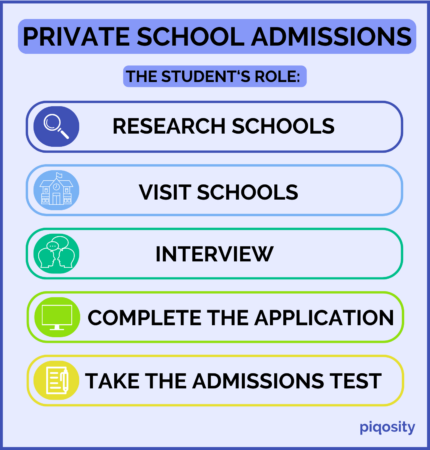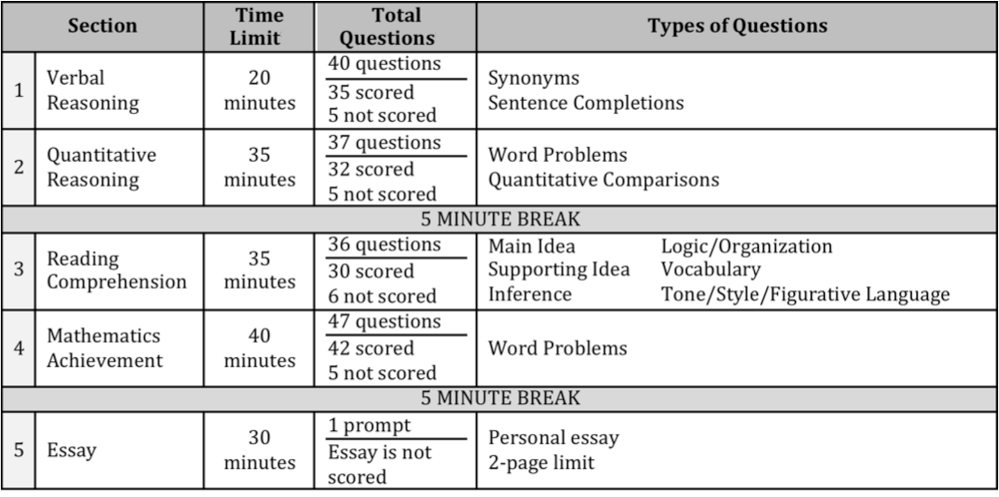
The ISEE test is part of a process in which you present yourself as a candidate to a group of people whom you have likely never met. This same group of people has to then decide if they like you or not based on your credentials and, in some cases, your personality. What sounds like a thorough job interview is, in fact, the admissions process for many excellent private high schools (and some public schools).
The private school admissions process is not something that rests solely on the shoulders of your parents. You, the student, have a job to do. In fact, all of your work for high school admissions will be very similar to the work you will do in your future college admissions.
Becoming knowledgeable early-on about the school(s) you’re applying to can help you gain admittance to a school that’s a perfect fit for you. Developing an interest in a school and getting excited about your future there will motivate you to put in your best effort throughout the application process and find ways to make your candidacy shine to the admissions office!
In a typical private school admission process, you must: research schools, attend school tours, “shadow” a school associate for a day, perform interviews, complete your portion of all school applications, and prepare for then take an admissions test (such as the ISEE).
Criteria to Consider When Researching Schools
You need to learn as much as you can about where you want to spend your 4-year high school career. By researching your school options, you can identify schools you really want to attend and ones you didn’t even know you wanted to attend.
The joy of the digital age is that information is an abundant commodity, but remember to look for information outside of the internet. Utilize every resource that you can, including:
- School websites
- Friends and families attending your school choices
- School visits or tours
- Community events featuring private and magnet schools
- Other online sources, such as educational publications
Though hearing others’ opinions about a prospective school is beneficial, you shouldn’t select a school based solely on its reputation, Instead, you want a school that fits as many of your needs and interests as possible. After all, the point is to spend the next four years of your life at the school you ultimately choose. When selecting your options, keep the following in mind:
Public versus Private
Even if you and your family are preparing for the private school admissions process, you should still consider the benefits of any magnet public schools in your district.
Public magnet schools can provide you with an excellent education, as can many private schools. You might want the diversity and larger size of public schools, or you may prefer the attention a teacher can provide in a classroom with fewer students at a private school.
Public schools are often chained to state bureaucracy, which could sometimes hamper your education. Smaller private schools might not have the budget for activities many larger schools can afford. And, of course, public schools are taxpayer-funded and free to attend, while private school tuition can cost thousands. You and your family must decide what matters most when it comes to public vs. private schools and weigh the opportunities against the compromises.
Religious Affiliation
Many private schools are religiously affiliated and require activities such as chapel and religion courses that are not required at unaffiliated schools. However, schools do not discriminate against religion and accept students of all faiths.
Regardless of affiliation, most private schools require community service to graduate, so make sure to look into the number of hours they require.
Academic Tracks and Curriculum
Think about what you want out of your education. You may want a school that provides many Advanced Placement courses, an International Baccalaureate program, or other challenging courses not normally offered in schools, such as Organic Chemistry. Many schools have specialized academic tracks you can choose from, such as a business track with accounting and finance classes or a programming track with IT classes and AP Computer Science.
By pursuing challenging and unique courses, you’ll surround yourself with high achieving peers who will motivate you to do your best. You’ll also be making progress with developing a strong transcript for your future college admissions. Consider the options different schools have and see which programs you’re most interested in!
Foreign Languages
Most schools offer the standard fare of Spanish and French language courses. However, many are attempting a wider range of options, including languages such as Chinese Mandarin, Arabic, Portuguese, German, Hindi, Japanese, Italian and more. Several schools also offer ASL (American Sign Language).
Aside from the many benefits of language-learning, knowing foreign languages can open doorways for you in your career. Knowing a second language can open up opportunities to work for global companies or travel for work.
Extracurricular Activities and Arts
The larger the school, the more likely it is to offer a wider range of extracurricular activities in which you can participate. At some of your school options, you may find some activities you never even thought of trying out. Learning about a variety of clubs and committing to your favorites is a great way to learn more about a certain field or hobby while developing your teamwork and leadership skills.
You may want a school with a strong Fine Arts program where you can explore your interests in art, theatre, photography, digital art, and more. Pay attention to the number of options a school provides for the arts and the competitions they regularly compete in.
Athletics
Perhaps you’re into sports or perhaps not. Either way, look at what athletic programs each school provides and the league with which they are associated.
However, don’t worry if a school does not offer a particular sport that you’re interested in. There are usually many athletic programs outside of schools in which you can participate, such as tennis or soccer clubs.
Co-Education versus Single-Sex Education
Realistically, the consideration of Co-ed vs. Single-sex schools is not something that you should weigh too heavily. Single-sex schools often interact with each other, bringing boys and girls together on joint projects (such as sports, theater, or band). So, don’t worry too much about being around only boys or girls in school.
Visit Prospective Schools: Tours and “Shadowing”
Schools will host their own school tours, usually as early as the first month of the school year. Make it a point to attend these tours—when you walk onto the school’s grounds, you will instantly get a gut feeling about the place.
Pay attention to the state of the building, classrooms, library, athletic facilities, arts buildings, restrooms, etc. Listen to the tour guide and observe any students you see.
Do not look for only the good things. Make an effort to note anything you don’t like about the school so that you have a more accurate picture of what you’re getting yourself into with that particular school. Do the same thing with any “shadowing” that you do, where you follow a student or faculty member around for a day at the school.
The Student Interview—Tips and Sample Questions
Some private schools require that you engage in an interview with an admissions member. These interviews are informal interactions where the admissions member figures out who you are as a student and as a person. In general, you perform the interview alone with the admissions member.
The name of the game with these interviews is confidence. Remember these tips to make sure you make a good first impression:
- Make eye contact with the interviewer throughout the interview. Wandering eyes suggest that you are not paying attention to or don’t care about what the interviewer is saying.
- Remain still in your chair and do not spin the chair if it is a swivel chair. Fidgeting suggests nervousness, and the interviewer will wonder if your behavior will be repeated in the classroom.
- Do not fold your arms across your chest! You will seem defensive, which suggests you will not get along well with the school’s teachers and your classmates. Instead:
- Rest your hands on your legs OR Clasp your hands in front of you on the table (if there is one). You will seem more attentive.
- Do not talk softly or mumble; speak up for the interviewer.
- Expect strange questions. Expecting the unexpected will help keep you from becoming flustered.
Aside from figuring out who you are, the admissions interviewer will be asking questions that demonstrate how you will fit into their school’s environment and academic program. Personality is important, but they may be wanting students more interested in sports or students who want to challenge themselves.
Example Private School Interview Questions
Provide specific examples to support your claims for your response to each question. Some questions will have different responses depending on the school.
- Why do you want to attend our school?
- What do you hope to get out of your education here at our school?
- In what clubs/organizations do you want to participate at our school?
- What is your favorite subject and why?
- In what sports do you want to participate at our school?
- In what clubs, organizations, or sports have you participated before?]
- What is your favorite book/movie?
- Where have you spent previous vacations? / Where would you like to travel next?
- Where did your parents and grandparents grow up?
- What schools did your parents attend (high school and college)?
- What is your family’s dynamic like (how does your family get along)?
Use these sample questions to prepare for the interview ahead of time—think through the reasons why you’re interested in attending the school, prepare to talk about yourself and your academic interests, and still expect to be suprised with unusual questions.
Complete the Application Responses
Of course, you have to complete an application for each school you’d like to attend.
Each application typically includes short response questions for both parents and students. These questions are your chance to give extra information on who you are as a person, your interests and hobbies, your skills and accomplishments, and your expectations from the school.
Here are some example questions for both parent and student responses:
Sample Student Response Questions:
- Tell us about your favorite subjects and why you like them.
- Tell us what else you would like us to know about you.
- Describe how our education can contribute to your future, and what you can contribute to this school.
Sample Parent Response Questions:
- In what ways, generally or specifically, do you expect your child to benefit from our school’s education?
- Upon meeting with your child, what lasting impressions do you think he or she will leave with our admission committee?
- Is there any other information you would like to share about your family/child that you feel is important for admission committee to know when making their recommendation?
Study For and Take the Admissions Test

The best part? You can try out all of Piqosity’s features with our free community account. When you’re ready to upgrade, Piqosity’s year-long accounts start at only $89. Plus, get a 10% off coupon just by signing up for our mailing list!



Leave A Comment